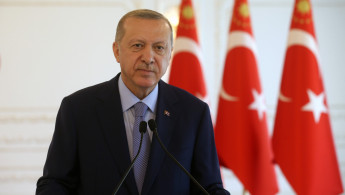US defence bill makes sanctions on Turkey mandatory within a month
President Donald Trump has threatened to veto the defence bill.
2 min read
Turkey has avoided sanctions under President Trump [Getty]
The final version of the annual United States defence bill mandates President Donald Trump to sanction Turkey over its purchase of Russian S-400 missile defence systems.
The NATO ally is supposed to face sanctions over the weapons purchase from Russia under the 2017 Countering America's Adversaries Through Sanctions Act (CAATSA).
But Ankara has so far avoided sanctions over the controversial acquistion under President Trump.
The $740 billion defence bill will force either President Trump or President-elect Biden to select from a list of CAATSA sanctions within 30 days, however.
Which White House adminstration acts on the bill depends on when it is passed; if passed after next week, it will be the responibility of the incoming Biden-Harris administration.
"Incredibly proud to have helped secure inclusion of a provision in the NDAA to do what President Trump refused to do: Officially determine on behalf of the US that Turkey took delivery of Russian S-400 defense systems and therefore will be sanctioned under existing law," said Bob Menendez, a leading member of the Senate Foreign Relations Committee.
The bill also includes a provision approving the US military's use of six F-35 jets that had been earmarked for Turkey's use before it was kicked out of the programme over the S-400s purchase.
President Trump has threatened to veto the annual defence bill over other provisions, however, including a requirement to rename several military bases named after Confederate generals.
The outgoing president also opposes the defence bill over its failure to repeal legal protections for social media companies and its support for US troops remaining in Germany.
A veto would require support in Congress, Reuters reported.
The bill has been passed every year since 1961.
There is a risk of a government shutdown if President Trump fails to sign the bill into law by Christmas, The Washington Post reported.
The threat of sanctions prompted yet another slip in the Turkish lira on Friday after a year of record lows.
Follow us on Facebook, Twitter and Instagram to stay connected
The NATO ally is supposed to face sanctions over the weapons purchase from Russia under the 2017 Countering America's Adversaries Through Sanctions Act (CAATSA).
But Ankara has so far avoided sanctions over the controversial acquistion under President Trump.
The $740 billion defence bill will force either President Trump or President-elect Biden to select from a list of CAATSA sanctions within 30 days, however.
Which White House adminstration acts on the bill depends on when it is passed; if passed after next week, it will be the responibility of the incoming Biden-Harris administration.
"Incredibly proud to have helped secure inclusion of a provision in the NDAA to do what President Trump refused to do: Officially determine on behalf of the US that Turkey took delivery of Russian S-400 defense systems and therefore will be sanctioned under existing law," said Bob Menendez, a leading member of the Senate Foreign Relations Committee.
The bill also includes a provision approving the US military's use of six F-35 jets that had been earmarked for Turkey's use before it was kicked out of the programme over the S-400s purchase.
President Trump has threatened to veto the annual defence bill over other provisions, however, including a requirement to rename several military bases named after Confederate generals.
The outgoing president also opposes the defence bill over its failure to repeal legal protections for social media companies and its support for US troops remaining in Germany.
A veto would require support in Congress, Reuters reported.
The bill has been passed every year since 1961.
There is a risk of a government shutdown if President Trump fails to sign the bill into law by Christmas, The Washington Post reported.
The threat of sanctions prompted yet another slip in the Turkish lira on Friday after a year of record lows.
Follow us on Facebook, Twitter and Instagram to stay connected





 Follow the Middle East's top stories in English at The New Arab on Google News
Follow the Middle East's top stories in English at The New Arab on Google News


